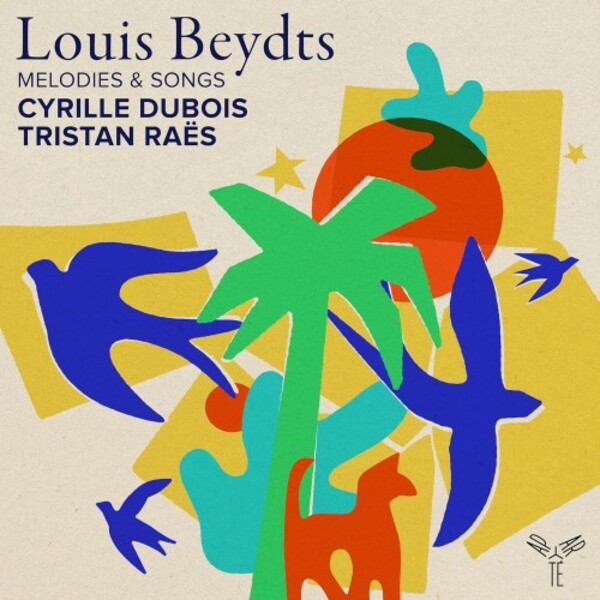BEYDTS Melodies & songs (Cyrille Dubois)
View record and artist detailsRecord and Artist Details
Composer or Director: Tristan Raës
Genre:
Vocal
Label: Aparte
Magazine Review Date: 04/2024
Media Format: CD or Download
Media Runtime: 82
Mastering:
DDD
Catalogue Number: AP345

Tracks:
| Composition | Artist Credit |
|---|---|
| D'Ombre et de soleil |
Louis Beydts, Composer
Cyrille Dubois, Tenor Tristan Raës, Composer |
| Six Ballades françaises |
Louis Beydts, Composer
Cyrille Dubois, Tenor Tristan Raës, Composer |
| Le Cœur inutile |
Louis Beydts, Composer
Cyrille Dubois, Tenor Tristan Raës, Composer |
| Quatre Odelettes |
Louis Beydts, Composer
Cyrille Dubois, Tenor Tristan Raës, Composer |
| Cinq Humoresques |
Louis Beydts, Composer
Cyrille Dubois, Tenor Tristan Raës, Composer |
| Le Pont Mirabeau |
Louis Beydts, Composer
Cyrille Dubois, Tenor Tristan Raës, Composer |
| La Fontaine de Pitié |
Louis Beydts, Composer
Cyrille Dubois, Tenor Tristan Raës, Composer |
| Deux mélodies, Movement: Le Sylphe |
Louis Beydts, Composer
Cyrille Dubois, Tenor Tristan Raës, Composer |
| Chansons pour les oiseaux |
Louis Beydts, Composer
Cyrille Dubois, Tenor Tristan Raës, Composer |
Author: Tim Ashley
Following on from their Gramophone Award-winning Fauré survey (8/22), Cyrille Dubois and Tristan Raës head into hitherto uncharted territory with a disc of songs and song-cycles by Louis Beydts (1895-1953), a pupil of Messager and Hahn, who made his name in the early 1930s as a composer of operettas before gravitating towards film music, with over 20 soundtracks to his credit. In later life he became director of the Opéra-Comique, where he oversaw a new 50th-anniversary production of Debussy’s Pelléas and the French premiere of Stravinsky’s The Rake’s Progress.
Dubois and Raës’s interest was sparked by an encounter with his 1948 cycle Chansons pour les oiseaux, one of only a handful of works previously recorded. ‘His style instantly had us charmed!’ Dubois writes in a booklet note, and one easily understands why. He’s a composer of some stature, by turns lyrical, refined and urbane. Dubois and Raës give us his major song-cycles (there are few stand-alone songs here), and you notice an attraction to late Symbolist poetry as it tips towards Surrealism, and a gravitation towards overriding themes of youth and age, time and memory. One song, ‘Mélancolie’, notably recorded in Beydt’s lifetime by the Opéra-Comique diva Géori Boué, does not appear on the physical disc, curiously, but is due for digital release on 28 June, a day before the anniversary of Beydt’s birth.
The cycles from the 1920s have elements of a sparky modernism, reminiscent at times of Les Six. Cinq Humoresques of 1928 uses poems by Tristan Klingsor (very different from his text for Ravel’s Shéhérazade) for a caustic sequence of amatory games, in which elderly lovers offer each other snuff where once they proffered roses, and freewheeling dissonances accompany gossipy innuendo about adultery. In the later cycles, the harmonic language is more stripped back, as whole-tone scales repeatedly suggest the movement of water (fountains dominate the poetic imagery) and nostalgia aches in pulsing chords and slow harmonic progressions that recall Hahn’s Études latines. The finest of the discoveries here is D’ombre et de soleil, an astonishingly beautiful cycle from 1946 to a text by Paul Jean Toulet, in which memories of a past affair broaden into an erotic reverie gradually stained by sadness and regret.
Dubois is very much in his element with Beydts’s lyrical yet declamatory vocal writing, and the poetic quality of his singing, familiar from his Fauré, proves equally beguiling here. Sense and sound are immaculately fused, colour and dynamics beautifully deployed. His soft singing is marvellous, so when Beydts is quietly trading in gossip (Cinq Humoresques) or indulging in intimate confessions (D’ombre et de soleil), Dubois seems to be whispering secrets into our ears. Elsewhere the voice can blaze with emotion: in D’ombre et de soleil again, when the sight of a sunrise reminds the lover of his first meeting with his beloved; or the closing pages of Quatre Odelettes, another fine cycle, which deals elliptically with the fulfilment of artistic creativity in solitude. Beydt’s piano-writing can sometimes sound deceptively simple, though Raës matches Dubois’s subtlety by making every chord, figuration and harmonic sidestep speak volumes. Another superb disc, in short, from a singer and pianist who always seem to think and feel as one. Its rediscoveries may prove significant, too: D’ombre et de soleil, above all, belongs by right in the regular repertory.
Discover the world's largest classical music catalogue with Presto Music.

Gramophone Digital Club
- Digital Edition
- Digital Archive
- Reviews Database
- Full website access
From £8.75 / month
Subscribe
Gramophone Full Club
- Print Edition
- Digital Edition
- Digital Archive
- Reviews Database
- Full website access
From £11.00 / month
Subscribe
If you are a library, university or other organisation that would be interested in an institutional subscription to Gramophone please click here for further information.




